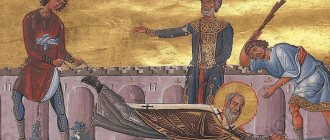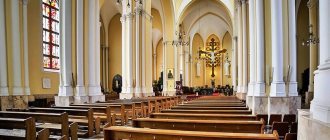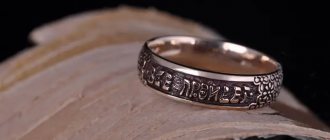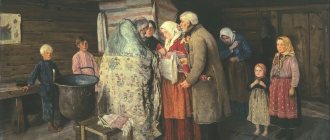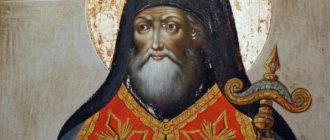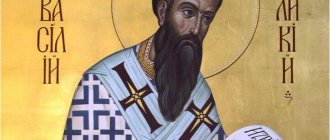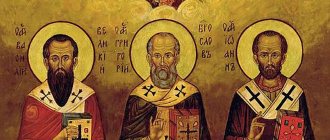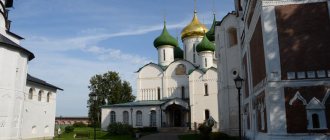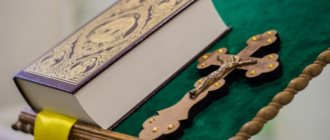| St. Nicholas the Wonderworker |
Nicholas the Wonderworker
(+ 342), Archbishop of Myra, Saint Commemoration May 9 - transfer of relics from Myra of Lycia to Bari, May 10 - stopping of the relics on the island. Zakynthos on the way from Myra Lycian to Bari (Greek [1]), July 29 - Christmas, May 20 - transfer of relics from Myra Lycian to Bari (Greek [2]), December 6 - repose and in the Councils of Leucadia (Greek ) and Tula saints.
Born in the second half of the 3rd century in the city of Patara, a region of Lycia in Asia Minor. His parents Theophanes and Nonna were from a noble family and very wealthy, which did not prevent them from being pious Christians, merciful to the poor and zealous towards God. They had no children until they were very old; in constant fervent prayer, they asked the Almighty to give them a son, promising to devote him to the service of God. Their prayer was heard: the Lord gave them a son, who at holy baptism received the name Nicholas, which means in Greek “victorious people.”
A legend has been preserved that during baptism, when the ceremony was very lengthy, the future saint, supported by no one, stood in the font for three hours.
All the unusual behavior of the child showed his parents that he would become a great saint of God, so they paid special attention to his upbringing and tried, first of all, to instill in their son the truths of Christianity and direct him to a righteous life. The youth soon comprehended, thanks to his rich talents and guided by the Holy Spirit, book wisdom. While excelling in his studies, the youth Nikolai also excelled in his pious life. He was not interested in the empty conversations of his peers: an infectious example of camaraderie leading to anything bad was alien to him.
Avoiding vain, sinful entertainment, the youth Nicholas was distinguished by exemplary chastity and avoided all unclean thoughts. He spent almost all his time reading the Holy Scriptures and performing feats of fasting and prayer. He had such love for the temple of God that he sometimes spent whole days and nights there in divine prayer and reading divine books.
Presbyter
The pious life of young Nicholas soon became known to all residents of the city of Patara. The bishop in this city was his uncle, also named Nikolai. Noticing that his nephew stood out among other young people for his virtues and strict ascetic life, he began to persuade his parents to give him to the service of the Lord. They readily agreed because they had made such a vow before the birth of their son.
His uncle, the bishop, ordained him a presbyter.
Having accepted the priesthood, Saint Nicholas began to lead an even more strict ascetic life. Out of deep humility, he performed his spiritual exploits in private. But God’s Providence wanted the saint’s virtuous life to direct others to the path of truth.
The uncle bishop went to Palestine, and entrusted the administration of his diocese to his nephew, the presbyter. Saint Nicholas devoted himself with all his soul to fulfilling the difficult duties of episcopal administration. He did a lot of good to his flock, showing widespread charity. By that time, his parents had died, leaving him a rich inheritance, which he completely used to help the poor. The following incident also testifies to his extreme humility.
In Patara there lived a poor man who had three beautiful daughters. He was so poor that he had no money to marry off his daughters. The unfortunate father's need led him to the terrible idea of sacrificing the honor of his daughters and extracting from their beauty the funds necessary for their dowry. But Saint Nicholas, having received a revelation from the Lord about his father’s criminal intentions, decided to deliver him from physical poverty, thereby saving his family from spiritual death. Taking a large bundle of gold, at midnight, when everyone was asleep and could not see it, he went up to the hut of the unfortunate father and threw the gold inside through the window, and he hurriedly returned home. In the morning, the father found gold, but could not know who his secret benefactor was. Deciding that God’s Providence Himself had sent him this help, he thanked the Lord and was soon able to marry off his eldest daughter. One of the following nights, the saint also secretly threw another bag of gold through the window into the poor man’s hut. The father soon gave his second daughter in marriage, firmly hoping that the Lord would show mercy to his third daughter in the same way. But he decided at all costs to recognize his secret benefactor and adequately thank him. To do this, he did not sleep at night, waiting for his arrival. Soon the good shepherd of Christ came for the third time. Hearing the sound of falling gold, the father hastily left the house and caught up with his secret benefactor. Recognizing Saint Nicholas in him, he fell at his feet, kissed them and thanked him as a liberator from spiritual death.
Pilgrimage to Palestine
Upon his uncle’s return from Palestine, Saint Nicholas himself gathered there. While traveling on the ship, he showed the gift of deep insight and miracles: he foretold the approaching severe storm and pacified it with the power of his prayer. Soon, here on the ship, he performed a great miracle, resurrecting a young sailor who had fallen from the mast onto the deck and died. On the way, the ship often landed on the shore. Saint Nicholas everywhere took care to heal the ailments of local residents: he healed some of incurable diseases, expelled from others the evil spirits that tormented them, and finally gave others consolation in their sorrows.
| St. Nikolai Mirlikiysky |
Upon his arrival in Palestine, Saint Nicholas settled near Jerusalem in the village of Beit Jala near Bethlehem.
All residents of this village are Orthodox; There are two Orthodox churches there, one of which, in the name of St. Nicholas, was built on the spot where the saint once lived in a cave, which now serves as a place of worship. There is a legend that while visiting the holy places of Palestine, Saint Nicholas wished one night to pray in the temple; He approached the doors, which were locked, and the doors, by the action of a miraculous force, opened themselves so that the saint could enter the temple and fulfill the pious desire of his soul.
Saint Nicholas wished to remain forever in Palestine, to withdraw from people and secretly strive before the Heavenly Father. But the Lord wanted such a lamp of faith not to remain hidden in the desert, but to brightly illuminate the Lycian country. And so, by will from above, the pious presbyter returned to his homeland.
Hermitage in Cyprus
According to some information, in the first half of the century, Saint Nicholas lived for a short period as a hermit in Cyprus, near the city of Paphos. With him was the Monk Eutyches, with whom the saint founded the Holy Monastery on the site of the pagan temple of Hera (Μονή των Ιερέων, Αγία Μονή, now the courtyard of the Kykkos monastery). Information about the construction of the monastery by the Monk Eutychius and St. Nicholas the Wonderworker was discovered by Ephraim of Athens in an ancient parchment manuscript, which at that time was in the sacristy of this monastery [3].
Return to Lycia and adoption of episcopal dignity
Wanting to get away from the bustle of the world, Saint Nicholas went not to Patara, but to the Zion Monastery (Μονή τῆς Νέας Σιών τῶν Μύρων), founded by his uncle, the bishop, about ten kilometers north of the city of Myra, where he was received by the brethren with great joy. He thought of staying in the quiet solitude of the monastic cell for the rest of his life.
But one day, while standing in prayer, he heard a voice: “Nikolai! You must enter into service to the people if you want to receive a crown from Me!” Obeying this command, Saint Nicholas left the monastery and chose as his place of residence not his city of Patara, where everyone knew him and showed him honor, but the large city of Myra, the capital and metropolis of the Lycian land, where, unknown to anyone, he could more quickly avoid worldly glory . He lived like a beggar, had no place to lay his head, but inevitably attended all church services. Archbishop John of the entire Lycian country has died. All local bishops gathered in Myra to elect a new archbishop. Much was proposed for the election of intelligent and honest people, but there was no general agreement. The bishops fervently prayed to God, asking him to indicate the most worthy person.
A man, illuminated by an unearthly light, appeared in a vision to one of the oldest bishops and ordered that night to stand in the vestibule of the church and notice who would be the first to come to the church for the morning service: this is the man pleasing to the Lord, whom the bishops should appoint as their archbishop; His name was also revealed - Nikolai. The elder bishop reported the revelation to others, who, hoping for God's mercy, intensified their prayers. As night fell, the elder bishop stood in the vestibule of the church, awaiting the arrival of the chosen one. Saint Nicholas, getting up at midnight, came to the temple. The elder stopped him and asked about his name. He quietly and modestly answered: “I am called Nikolai, servant of your shrine, Master!”
By the name and deep humility of the newcomer, the elder was convinced that he was God’s chosen one. He took him by the hand and led him to the council of bishops. Everyone joyfully accepted him and placed him in the middle of the temple. Despite the night time, the news of the miraculous election spread throughout the city; a lot of people gathered. The elder bishop, who was granted the vision, addressed everyone with the words: “Receive, brothers, your shepherd, whom the Holy Spirit has anointed for you and to whom he has entrusted the stewardship of your souls. It was not a human council, but the Judgment of God that established it. Now we have the one we were waiting for, accepted and found, the one we were looking for. Under his wise guidance, we can confidently hope to appear before the Lord on the day of His glory and judgment!”
Upon entering the administration of the Myra diocese, Saint Nicholas said to himself: “Now, Nicholas, your rank and your position require you to live entirely not for yourself, but for others!”
Now he did not hide his good deeds for the good of his flock and for the glorification of the name of God; but he was, as always, meek and humble in spirit, kind in heart, alien to all arrogance and self-interest; observed strict moderation and simplicity: wore simple clothes, ate lean food once a day - in the evening. All day long the great archpastor performed works of piety and pastoral service. The doors of his house were open to everyone: he received everyone with love and cordiality, being a father to orphans, a nourisher to the poor, a comforter to those who weep, and an intercessor to the oppressed. His flock flourished.
Persecution of Diocletian
But the days of testing were approaching. The Church of Christ was persecuted by Emperor Diocletian (284-305). Temples were destroyed, divine and liturgical books were burned; bishops and priests were imprisoned and tortured. All Christians were subjected to all sorts of insults and torments. The persecution also reached the Lycian Church.
During these difficult days, Saint Nicholas supported his flock in the faith, loudly and openly preaching the name of God, for which he was imprisoned, where he did not cease to strengthen the faith among the prisoners and confirmed them in a strong confession of the Lord, so that they would be ready to suffer for Christ.
Diocletian's successor Galerius stopped the persecution. Saint Nicholas, upon leaving prison, again occupied the See of Myra and with even greater zeal devoted himself to the fulfillment of his high duties. He became famous especially for his zeal for the establishment of the Orthodox faith and the eradication of paganism and heresies.
Fight against Arianism
The Church of Christ suffered especially greatly at the beginning of the century from the heresy of Arius, who rejected the deity of the Son of God and did not recognize Him as Consubstantial with the Father.
Wanting to establish peace in the flock of Christ, shocked by the heresy of Ariev’s false teaching, Equal-to-the-Apostles Emperor Constantine the Great convened the First Ecumenical Council of 325 in Nicaea, where three hundred and eighteen bishops gathered under the chairmanship of the emperor; here the teachings of Arius and his followers were condemned.
There is a legend that during one of the council meetings, unable to tolerate the blasphemy of Arius, Saint Nicholas struck this heretic on the cheek. The Fathers of the Council considered such an act an excess of jealousy, deprived St. Nicholas of the benefits of his episcopal rank - the omophorion - and imprisoned him in a prison tower. But they were soon convinced that Saint Nicholas was right, especially since many of them had a vision when, before their eyes, our Lord Jesus Christ gave Saint Nicholas the Gospel, and the Most Holy Theotokos placed an omophorion on him. They freed him from prison, restored him to his former rank and glorified him as a great saint of God.
However, there is no confirmation of this story or the very fact of St. Nicholas’s participation in the First Ecumenical Council (there is no mention in surviving documents). According to some researchers, this may indicate that the incident described in the life occurred not at the First Ecumenical Council, but at some local Council.
The local tradition of the Nicene Church not only faithfully preserves the memory of St. Nicholas, but also sharply distinguishes him from among the three hundred and eighteen fathers, whom he considers all his patrons. Even Muslim Turks have deep respect for the saint: in the tower they still carefully preserve the prison where this great man was imprisoned.
Activities of the saint after the Council
| St. Nikolai Mirlikiysky |
While caring for the spiritual needs of his flock, Saint Nicholas did not neglect to satisfy their bodily needs.
When a great famine occurred in Lycia, the good shepherd, in order to save the starving, created a new miracle: one merchant loaded a large ship with bread and on the eve of sailing somewhere to the west he saw St. Nicholas in a dream, who ordered him to deliver all the grain to Lycia, for he was buying he has all the cargo and gives him three gold coins as a deposit. Waking up, the merchant was very surprised to find three gold coins actually clutched in his hand. He realized that this was a command from above, brought bread to Lycia, and the starving people were saved. Here he spoke about the vision, and the citizens recognized their archbishop from his description. Even during his lifetime, Saint Nicholas became famous as a pacifier of warring parties, a defender of the innocently condemned, and a deliverer from vain death.
During the reign of Constantine the Great, a rebellion broke out in the country of Phrygia. To pacify him, the king sent an army there under the command of three commanders: Nepotian, Urs and Erpilion. Their ships were washed up by a storm on the shores of Lycia, where they had to stand for a long time. The supplies were depleted, and they began to rob the population who resisted, and a fierce battle took place near the city of Plakomat. Having learned about this, Saint Nicholas personally arrived there, stopped the hostility, then, together with three governors, went to Phrygia, where with a kind word and exhortation, without the use of military force, he pacified the rebellion. Here he was informed that during his absence from the city of Myra, the local city governor, Eustathius, innocently sentenced to death three citizens slandered by their enemies. Saint Nicholas hurried to Myra and with him three royal commanders, who were very fond of this kind bishop, who had rendered them a great service.
They arrived in Myra at the very moment of execution. The executioner is already raising his sword to behead the unfortunate, but Saint Nicholas with his imperious hand snatches the sword from him and commands the release of the innocently condemned. None of those present dared to resist him: everyone understood that the will of God was being done. The three royal commanders marveled at this, not suspecting that they themselves would soon need the miraculous intercession of the saint.
Returning to the court, they earned the honor and favor of the king, which aroused envy and enmity on the part of other courtiers, who slandered these three commanders before the king as if they were trying to seize power. Envious slanderers managed to convince the king: three commanders were imprisoned and sentenced to death. The prison guard warned them that the execution was to take place the next day. The innocently condemned began to fervently pray to God, asking for intercession through St. Nicholas. That same night, the saint of God appeared in a dream to the king and imperiously demanded the release of the three commanders, threatening to rebel and deprive the king of power.
“Who are you that you dare to demand and threaten the king?”
- I am Nicholas, Archbishop of Lycia!
Waking up, the king began to think about this dream. That same night, Saint Nicholas also appeared to the governor of the city, Evlavius, and demanded the release of the innocently convicted.
The king called Evlavius to him, and having learned that he had the same vision, he ordered three commanders to be brought.
“What kind of witchcraft are you doing to give me and Eulavius visions in our sleep?” - the king asked and told them about the appearance of St. Nicholas.
“We don’t do any witchcraft,” the governors answered, “but we ourselves previously witnessed how this bishop saved innocent people from the death penalty in Myra!”
The king ordered their case to be examined and, convinced of their innocence, released them.
During his life, the saint provided help to people who even did not know him at all. One day, a ship sailing from Egypt to Lycia was caught in a severe storm. The sails were torn off, the masts were broken, the waves were ready to swallow the ship, doomed to inevitable death. No human power could prevent it. One hope is to ask for help from St. Nicholas, whom, however, none of these sailors had ever seen, but everyone knew about his miraculous intercession. The dying shipmen began to pray fervently, and then Saint Nicholas appeared at the stern at the helm, began to steer the ship and brought it safely to the harbor.
| Dormition of St. Nicholas. Fresco |
Not only believers, but also pagans turned to him, and the saint responded with his constant miraculous help to everyone who sought it.
In those he saved from physical troubles, he aroused repentance for sins and a desire to improve their lives. According to Saint Andrew of Crete, Saint Nicholas appeared to people burdened with various disasters, gave them help and saved them from death: “With his deeds and virtuous life, Saint Nicholas shone in the World, like a morning star among the clouds, like a beautiful moon in its full moon. For the Church of Christ he was a brightly shining sun, he adorned Her like a lily at a spring, and was for Her a fragrant world!”
Saint Nicholas died peacefully on December 6, 342 [4], at a ripe old age, and was buried in the cathedral church of the city of Myra.
The Lord granted his honest body incorruptibility and special miraculous power. His relics continue to this day to exude fragrant myrrh, which has the gift of working miracles.
Transfer of relics to Bari
| Transfer of the relics of St. Nicholas from Myra in Lycia to Bar-grad. From the iconostasis of the Church of St. Nicholas the Wonderworker, Berezhki churchyard. 1794 Kineshma. |
More than seven hundred years have passed since the death of the saint.
The city of Myra and the entire Lycian country were destroyed by the Turks. The ruins of the temple with the tomb of the saint were in disrepair and were guarded by only a few monks. In 1087, Saint Nicholas appeared in a dream to an Apulian priest of the city of Bari (in southern Italy) and ordered his relics to be transferred to this city. Different manuscripts give different reasons for this. Among them: the threat of desecration of the shrine by foreign invaders; the “heinous outrage” committed by a temple servant at the saint’s tomb; the devastation of Mir by the Seljuk Turks and the resettlement of the inhabitants to a nearby mountain; and even missionary work - “shepherd of Christ’s flock, father, sending the other sheep to the Latin language, so that you will surprise everyone with your miracles and lead them to Christ...”
[5].
The presbyters and noble citizens of Bari equipped three ships for this purpose and, under the guise of traders, set off. This precaution was necessary in order to lull the vigilance of the Venetians, who, having learned about the preparations of the inhabitants of Bari, had the intention of getting ahead of them and bringing the relics of the Saint to their city.
The nobles, taking a roundabout route through Egypt and Palestine, visiting ports and conducting trade as simple merchants, finally arrived in the Lycian land. The scouts sent reported that there were no guards at the tomb and it was guarded only by four old monks. The barians came to Myra, where, not knowing the exact location of the tomb, they tried to bribe the monks by offering them three hundred gold coins, but due to their refusal, they used force: they tied up the monks and, under the threat of torture, forced one faint-hearted person to show them the location of the tomb.
A wonderfully preserved white marble tomb has been opened. It turned out to be filled to the brim with fragrant myrrh, in which the relics of the saint were immersed. Unable to take the large and heavy tomb, the nobles transferred the relics into the prepared ark and set off on the return journey.
The journey lasted twenty days, and on May 9, 1087 they arrived in Bari. A solemn meeting was arranged for the great shrine with the participation of numerous clergy and the entire population. Initially, the relics of the saint were placed in the church of St. Eustathius.
| Relics of St. Nicholas in Bari |
Many miracles happened from them.
Two years later, the lower part (crypts) of the new temple was completed and consecrated in the name of St. Nicholas, built deliberately to store his relics, where they were solemnly transferred by Pope Urban II on October 1, 1089. The upper part of the temple (basilica) was built much later - on June 22, 1197. The day of the arrival of the relics in Bar-grad (May 9) is celebrated there very solemnly. For this day, pilgrims flock there not only from Western Europe, but also from Russia, where May 9 is also celebrated. The service to the saint, performed on the day of the transfer of his relics from Myra Lycia to Bargrad - May 9 - was compiled in 1097 by the Russian Orthodox monk of the Pechersk monastery Gregory and the Russian Metropolitan Ephraim.
There is a widespread opinion that the Greek Church does not recognize the feast of the transfer of the relics of St. Nicholas is erroneous. In the modern Greek calendar, this event is celebrated on May 20th. This memory was included in the printed calendar thanks to the Monk Nicodemus the Holy Mountain (1809), who discovered information about this holiday in a number of Athonite manuscripts, translated the corresponding synaxaran legend from Church Slavonic, and himself wrote a service for the transfer of the relics of St. Nicholas. According to Rev. Nicodemus, the relics were taken out of Myra Lycian on April 1, and made a stop at Fr. Zakynthos on May 10, namely on May 20, were brought to Bari. One of the early manuscripts with an exact date mentions May 9 as the date of the transfer of the relics of St. Nicholas, is the Typicon of the Cryptoferrat Monastery of 1300. The date of May 20 is recorded in a number of Byzantine manuscripts, the earliest known to us is the May service Menaion of 1431 from the library of the Vatopedi Monastery No. 1145 [6].
In Rus', since the 16th century, the Nativity of the Saint was also celebrated - July 29. The holiday was abolished during the reign of Catherine the Great and was revived in 2004 with the blessing of Patriarch Alexy II.
The memory of St. Nicholas is also celebrated at church services weekly, every Thursday, with special chants.
Prayers
Troparion, tone 4
The rule of faith and the image of meekness, / self-control of the teacher / show you to your flock, / Even the truth of things: / for this reason you have acquired high humility, / rich in poverty, / holy Father Father Nikolai,/ pray to Christ God // to save our souls.
Kontakion, tone 3
In Mireh, the holy one, the priest appeared to you:/ O Christ, having fulfilled the Gospel,/ you laid down your soul for your people/ and saved the innocent from death:/ with For his sake you were sanctified, // like a great hidden place of God’s grace.
Troparion for the Nativity, tone 4
Your wonderful and glorious Christmas, to St. Nicholas, / The Church celebrates the Orthodox today with light, / for by standing your foot / the Lord will reveal you and proclaim you to be a lamp and a teacher to the laity,/ the whole world enriching and enlightening miracles,/ therefore we cry out to you // pray Christ God may save our souls.
Troparion for Christmas, tone 2
Today your triumph shines upon us like the sun, Father Nicholas, / for at your Nativity you made the angels rejoice with the wondrous standing of your feet, and you surprised men, / against but now you have frightened him,/ and now the Church of Christ is adorned like a bride,/ and in a high voice he cries joyfully:/ my goodness is clearly understood,/ come, faithful ones, rejoice/ and raise up your salvation and spiritual incorruption,/ a quick helper in troubles, a quick helper in sorrows eater, / in the sea, a quiet refuge for the overwhelmed, / hungry for a nourisher, blind leader, beggars wealth,/ the rod of the elders, the chastiser of the young, and the purity of the teacher,/ and all who come with faith // receive healing of souls and bodies.
Kontakion for Christmas, tone 3
In Mireh, Saint Nicholas, was born, / from a noble root, / like a fruitful branch, you grew cold, / for you were filled with Divine gifts, / like the sun at dawn, the whole world is full of miracles You have enlightened us./ For this reason we glorify you, // as a disciple and a keeper of the hidden God's grace.
Kontakion for Christmas, tone 3
Like a bright star shone forth, O blessed Nicholas, / in the middle of the city of Lycia, you were born to a righteous man, Father, / and in your honorable Nativity, wonderful and glorious is your display of the Lord Yes,/ and in your holy infancy a wondrous thing was revealed about you./ For you preached the Trinity / standing for three hours with your honest feet on the ground at the hour of your birth, / and fed from the breast of your right hand, but not from the left, / on Wednesday and Friday alone, and then in the evening, / and from that , father, you were known abstinence is an unflattering rule, // and as if it were a great secret place of God’s grace.
Troparion for the Transfer of Relics, Tone 4
The day of the bright celebration has arrived, / the city of Barsky rejoices, / and with it the entire universe rejoices / with songs and spiritual songs: / today is a sacred celebration / in the presentation of honest and multi-healing relics / Saint and Wonderworker Nicholas, / like the unsetting sun rising with radiant rays / and dispelling the darkness of temptations and troubles from those who cry out truly:/ save us, as our representative,// the great Nicholas.
Kontakion for the Transfer of Relics, Tone 3
Rise up, like a star, from the east to the west/ your relics, O Saint Nicholas,/ the sea was illuminated by your procession,/ and the city of Barsky receives your grace:/ you appeared to us, a miracle graceful, // wonderful and merciful.
The death and relics of St. Nicholas the Wonderworker
The saint reposed in 345 in Myra in Lycia. After his death, the saint’s body began to exude myrrh—fragrant oil. First a basilica and then a temple were built over his grave. In 1087 the relics of St. Nicholas the Wonderworker were kidnapped by the Italians and transported to the Italian city of Bari, where they remain to this day. Crowds of pilgrims flock to the myrrh-streaming relics of the saint every day, where many receive healing.
Memorial Day of St. Nicholas the Wonderworker:
- The day of death is December 19.
- The day of transfer of relics is May 22.
- The saint's birthday is August 11.
A critical examination of the life of St. Nicholas
A critically processed biography of him still does not exist. In his famous life, placed in the “Chetia-Minea” of St. Demetrius of Rostov, borrowed, with abbreviations, from the legends of Simeon Metaphrast and distributed in countless retellings, features of the life of this saint. are mixed with the acts of another Saint Nicholas, Bishop of Pinar (also in Lycia), who lived two centuries later - in the century, as is proven by comparing the Metaphrastic life of St. Nicholas of Myra with the life of Nicholas of Pinar, found and published in 1720 by Archbishop. Phalakonium. Added to this are undoubted anachronisms in the legend of Metaphrast about Nicholas of Myra; so, it says that St. Nicholas, while still a presbyter, visited Jerusalem and entered its temple, the doors of which themselves opened before him, after which, returning to Myra, he became a confessor under Diocletian and Maximian - meanwhile, the Jerusalem temple was built no earlier than 30 years after Maximian.
The Bollandists Sollerius and Janning knew the life of St. Nicholas, compiled by the Patriarch of Constantinople Methodius.
The famous archaeologist, Archimandrite Antonin (Kapustin), published in Russian translation both the life of Nicholas of Pinar, found by Philakonius [7], and two lives of Nicholas of Myra, which he himself found in the monasteries of St. Savva in Palestine and in Sinai [8], and from comparing them I came to the conviction that undoubtedly the authentic features of the life of Nicholas of Myra from the legend of Metaphrastus remain: his birth in Patara, not tasting his mother’s milk in infancy on Wednesday and Friday, his miraculous election to the bishopric Myra, his confession under Diocletian for the destruction of pagan temples, his presence at the First Ecumenical Council, his intercession for three men in Myra, his appearance of St. Constantine in Constantinople; with some probability, the legend about girls (2 or 3 sisters) saved from debauchery can also be attributed to it. Most of the remaining features of Metaphrastus' legend about Nicholas of Myra are found in the life of Nicholas of Panarus, and can most likely be attributed to the biography of St. Nicholas century, and a significant part of the miracles can be attributed with equal probability to both saints.
To finally resolve the question of the normal composition of the biography of St. Nicholas of Myra Antonin (Kapustin) found it necessary to wait for the publication and evaluation of new copies of his life, in new editions and versions, of which there are still many in the libraries of the East, for example. on Athos.
Life of Nicholas the Wonderworker
Many residents of Russia consider Nicholas the Wonderworker to be a truly Russian saint. However, he has never been to our country.
He was born in 270 in the Roman Empire, in the ancient Lycian city of Patara. It was a Greek colony at that time. His parents were wealthy people and deeply religious Christians. Nicholas showed his first miracle and that life belonged to God during the Sacrament of Baptism , when a baby, unable to speak or walk, stood in the font for three whole hours, praising the Creator.
Then he increasingly showed an example of faith to his parents: on fasting days, the child refused to breastfeed, as if the time of fasting had been written in his heart from birth! As Nikolai grew older, he began to pray more and more, especially at night. He was not interested in children's games; he spent most of his time in the temple. His uncle was the Bishop of Patara, he elevated Nicholas to the rank of reader and then deacon at a fairly young age, knowing about his piety.
Help a neighbor
Soon Nikolai became a priest. When his parents died, he gave away all his property to the poor. His feat is known when, at the age of sixteen, he learned about his impoverished neighbor, who decided to send his daughters to the ancient profession. Nikolai knew these girls from childhood, and he felt very sorry for them. Then he decided at night to throw a bag of gold coins that were left over from their inheritance through their window. Nikolai then watched how the owner spent the money . The delighted father used these funds to arrange a wedding for his eldest daughter.
Then the next night Nikolai again threw a bag of gold at them through the window. The father married off his second daughter, but was wondering who was helping them. He really wanted to see his benefactor, so he hid and waited for the unknown person to come throw a third bag at them through the window. So Nikolai was declassified. The father thanked the kind young man with tears.
Icons usually depict a bishop throwing a bag of gold out of a window. But in fact, Nikolai was not in office at that time. Since then, the saint has become the prototype of Santa Claus (or Father Frost), who puts gifts under the tree at night.
When the bishop died in the city of Myra, the residents unanimously wished to have Nicholas in this post, knowing about his virtuous life. Having become a bishop, Nicholas immediately issued a decree to end the persecution of Christians. He also fought against paganism and defended the faith from heresies. slapped the heretic Arius at the Ecumenical Council
Nikolai Ugodnik - why is he called that?
St. Nicholas the Wonderworker is often popularly called St. Nicholas the Pleasant - that is, a saint who pleased God. Although, in fairness, any saint, not just Nicholas, pleased God in his life - because the very essence of holiness is servility.
Holiness is not just good deeds and deeds - they do not make you a saint. Holiness is the acquisition of such Grace as can only be accepted by people who are pure in heart. And keeping your heart pure is the best way to please God.
Saints are given the Grace of the Holy Spirit, and it helps them to accomplish feats that they, the saints, would never have accomplished on their own without God’s Help. And only with God’s Help was it possible to live the intense life that St. Nicholas lived—who, like every saint, pleased God.
Acceptance of archbishopric rank
Returning to Lycia, the saint of God did not settle in Patara, since there his name was surrounded by universal veneration, and he tried to avoid worldly glory. He chose the large and populous city of Myra as his place of residence, where no one knew him. However, even there his holiness did not remain hidden from people. By the will of God, Saint Nicholas was soon honored to take the vacant place of archbishop and head of the entire Lycian Church.
Having accepted the archpastoral rank, Saint Nicholas set an example in everything to follow for his large flock. The doors of his house were constantly open to all those in need of help and support. Imitating the holy apostles, whose successor he was, the saint brought the word of God to people, but, in addition, he became a support in their earthly life, trying, if possible, to be useful to everyone. That is why it has become a tradition to offer prayers to Nicholas the Wonderworker for help in work and in all other everyday matters.
Test strip of flesh and spirit
For several years, the saint peacefully shepherded the flock of God entrusted to him, until the enemy of the human race instilled hatred of Christians in the hearts of the two wicked kings Maximian and Diocletian. They issued a decree according to which everyone who professed the teachings of Christ and did not want to renounce it was to be thrown into prison, and then given over to torture and death. Among the other prisoners who suffered for their faith was everyone’s beloved Archbishop Nicholas. Once in prison, he endured suffering with extraordinary courage and supported those around him with his archpastoral words.
But the all-merciful Lord did not allow the wicked to commit lawlessness for a long time. The power of the godless kings collapsed, and Emperor Constantine I the Great, who replaced them on the throne, made Christianity the state religion. One of his first acts was the convening of an Ecumenical Council in the city of Nicaea, at which the holy fathers of the church, among whom was the Archbishop of the Lycian city of Myra, condemned the heretical teaching of the wicked Arius. The life of Nicholas the Wonderworker, a brief summary of which formed the basis of this story, reproduces in all its details the scene of his fiery speech, which served the triumph of true Christian teaching.
Led by the Christians of Patara
An important event noted in the biography of Nicholas the Wonderworker is the departure of his uncle to Palestine, where he went to worship holy places. Leaving Patara for a long period of time, the archpastor entrusted the management of all church affairs to his nephew, since he considered him sufficiently mature spiritually to fulfill such a high mission.
Having become the head of the church life of the city, Saint Nicholas fulfilled his duties as zealously as his uncle, who was in Palestine at that time. This stage of his earthly path was marked by a very characteristic event, testifying to the young presbyter’s commitment to eternal values.
Soon after the bishop's departure, the Lord called the parents of Saint Nicholas to His Heavenly palace, and he became the heir to a very significant estate. However, instead of taking advantage of the benefits he received and surrounding himself with comfort, he sold all the property he received and gave the money to the poor. By this, Saint Nicholas exactly fulfilled the covenant of Jesus Christ, which he gave to all who wished to gain eternal life.
Word of the Patriarch: Living Memory
From the sermon of His Holiness Patriarch Kirill on the day of remembrance of St. Nicholas, Archbishop of Myra in Lycia [1]:
“On December 19, our Church solemnly glorifies the memory of St. Nicholas, Archbishop of Myra in Lycia, Wonderworker. Saint Nicholas lived at the end of the 3rd - beginning of the 4th century. We are separated from him by almost 1,700 years, and during all these centuries his memory has been carefully preserved in the Church, because he lived an amazing life, acquired enormous strength of spirit, and with his ardent faith he came so close to God that God gave him a special power - the power perform miracles.
The memory of the Church is its tradition. When we study history, we know about some historical events, but we rarely remember them, and very often we forget what we learned at school or university. This is a dead memory - it does not live, it does not activate spiritual forces, it does not constantly influence the human mind. But the memory preserved in the Church, the tradition of the Church, is a living memory; it is supported and fertilized by sincere prayer, which a person offers to those whom he remembers - God's saints.
Our memory of St. Nicholas is so vivid that we sometimes turn to him every day, asking him to help in our lives. And we receive an answer from him - our prayers come true..."
Ordination to the Priesthood
The pious parents responded with great willingness to the proposal of their closest relative, the bishop of the city of Patara, who advised them to dedicate their son to God. This archpastor of God, who also bore the name Nicholas, was the future saint’s uncle and from an early age took upon himself the work of his spiritual care. Rejoicing at the sight of how the boy, moving away from the temptations of the vain world, constantly sought communication with God, the uncle, with his inner eye, saw in his nephew the future vessel of true faith. From that time on, the fate of St. Nicholas the Wonderworker was inextricably linked with the service of the Church.
After several years spent studying the Holy Scriptures and the teachings of the Church Fathers, Bishop Nicholas ordained his charge to the priesthood. The life of St. Nicholas the Wonderworker says that after the sacrament was performed, the archpastor, turning to the parishioners who filled the temple, said that the Lord showed them “a new sun rising over the earth.” His words turned out to be truly prophetic.
Having become a presbyter, which, according to the most ancient canons, corresponded to the second degree of priesthood, Saint Nicholas worked tirelessly, fulfilling his pastoral mission. Being a mortal, like all the people around him, he strived with all his soul to imitate ethereal forces, filling his life with fasting and prayer. Such deep dedication allowed him to ascend to a high level of spiritual perfection and become worthy to rule the Church.
Worship of holy places
Having made a stop in Alexandria and healed many suffering people there, the holy saint of God continued his journey and arrived safely in Palestine. In the holy city of Jerusalem, he poured out his warm prayers to the Lord, standing on the stones of Golgotha, which witnessed His torment on the cross for the salvation of the human race. He also visited other places connected with the earthly life of Jesus Christ, everywhere offering prayers and glorifying God.
The book of the life of Nicholas the Wonderworker describes, in particular, how the doors of one Jerusalem church, locked at night, opened before him by themselves, testifying to the fact that the entrance to the temple of God is not forbidden to those for whom the Heavenly Gates are open. Having stayed in the holy land for a long time, Saint Nicholas wanted to retire to the desert, and there, exhausting himself with ascetic deeds, continue serving God, but a voice from above commanded him to return to his homeland.
